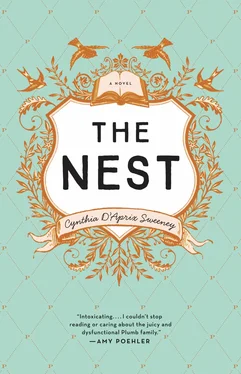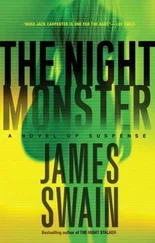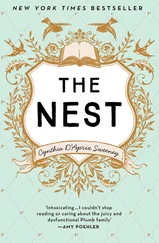Melody had arrived early to intercept her brothers and sister before they found seats at the counter. She’d made the bold move of reserving them a table in the dining room. She was sick of the counter; it was hard for a group of four to talk when sitting in a row unless they got an end spot, which rarely happened. They needed to talk today, and she’d always wanted to eat in the dining room, sitting around a table, like civilized New Yorkers would. But Leo was late and the maître d’ would only seat a complete party. They’d ended up at the counter fending off the waiter with orders of shrimp cocktail and Coke.
“We could have just said we were three and then pulled up a chair when Leo comes,” Jack said. “ If he comes.”
“He’ll be here,” Bea said.
“You’ve spoken to him?” Jack asked.
“No, but he’ll be here.”
Melody was glumly opening another pack of oyster crackers. The maître d’ had snapped her head off when she’d asked if he’d save them a corner table. “Madam,” he’d said, sourly, “ please enjoy yourself at the counter seats.”
“Have you spoken to him?” Jack asked Melody.
“Me?” Melody said, surprised. “No. Leo never calls me.”
“I got an e-mail from him at work on Friday,” Bea said. “But since he’s not here yet, maybe we should talk about what to say when he does get here.”
The three of them squirmed on their stools a bit, eyed one another warily.
“Well,” Melody said. “I—”
“Go on,” Bea said.
“I think we should, obviously, make sure he’s okay.” Melody spoke haltingly; she was unaccustomed to going first. Jack looked dubious. Bea smiled encouragingly. Melody sat up a little straighter. “I think we inquire after his health. Find out where he’s staying. Offer our support.”
Bea was nodding along to everything Melody said. “Agreed,” Bea said.
“And then?” Jack said, pointedly.
“And then I guess we ask about The Nest,” Melody said. “I don’t know. How would you like to start?”
“I’d like to hand him an invoice and ask him when he’s paying it,” Jack said.
Bea swiveled on her stool to face Jack. “Are you guys in some kind of financial trouble? Is Walker not working or something?”
Jack let out an exasperated puff. “Walker is working. Walker is always working . I would like to offer Walker the opportunity to not work for a bit. Eventually. As in next year, which was our plan and has been our plan forever — that Walker could cut back and we’d spend more time in the country. ” Jack trailed off. He was not comfortable talking to his sisters about any of this. He wanted to get Leo alone and make his pitch for payback priority without the other two interfering.
“I’m worried, too, you know,” Melody said. “Soon we’ll be paying college tuition. You can’t imagine what it costs now. And the house—”
“What about the house?” Bea asked.
Melody didn’t want to talk about her house, about Walter’s completely insane and unacceptable idea about her house. “It’s expensive!” she said.
Bea waved at the waiter and gestured for drink refills. “I get that this stinks for all of us,” she said, “but I also know Leo. If we go on the offensive today—” She shrugged and looked back and forth at Melody and Jack. “You know I’m right. He’ll just avoid us.”
“He can’t avoid us forever,” Jack said.
“What are we going to do?” Bea said. “Stake him out? Garnish his nonexistent wages? Beg?”
“I think Bea’s right,” Melody said.
“Since when has being nice to Leo worked?” Jack said. “Since when has anything successfully forced Leo to not put Leo first?”
“People change,” Bea said, opening up another pack of oyster crackers.
“More often, people stay exactly the same.”
“I still don’t understand why he didn’t fight Victoria on the apartment and everything else,” Melody said. “Why he didn’t try harder to recover something. ”
“You don’t?” Bea had a flash of that night in the ER, Leo’s face, his sutured chin, the whispers and moans on the other side of the curtain, the sobbing parents in the hallway, the mother quietly keening and fingering a rosary. “I do,” she said. “You would, too, if you’d been there.”
Melody became very invested in fishing a wedge of lemon from her soft drink and not thinking about the waitress. They’d been out of town the weekend of the wedding and had missed the entire mess. Jack had missed it, too; he never attended family functions. Melody needed to keep her energy focused on where it mattered: her daughters, her husband, her home.
“Oh, please,” Jack said. “That’s hardly the whole story. Something else is going on.” He was creating tiny origami-like folds on one corner of the paper placemat. “This is Leo we’re talking about. He’s got money hidden away somewhere. I know it.”
“What do you mean you know it?” Melody said. “You have proof?”
“No, but it’s the only thing that makes sense. I know it in my bones. Think about it. Since when has Leo been afraid of a fight?”
“Bea? What do you think?” Melody said.
“I don’t know,” Bea said, but the same thought had occurred to her. “How would that even work?”
“Oh, there are ways,” Jack said. “It’s surprisingly easy.”
The waiter was circling them now, annoyed. They’d decimated countless packs of oyster crackers, and empty cellophane wrappers and crumbs littered the space in front of them. Bea started gathering the crumbs into a small pile and brushing them onto a bread and butter plate.
“He’s not coming,” Jack said.
Bea checked her phone. “He’s just on Leo time.”
Then, as if on cue, Bea saw Melody sit up a little straighter and raise her left hand and nervously fluff her too-blond bangs. A tentative smile lifted the lower half of her face. Jack straightened, too. His jaw slid forward the way it did when he was feeling defensive, but then he stood and gave a beckoning wave and before Bea could turn around, she felt a hand on her shoulder, its familiar heft and quiet preferential squeeze, and her heart did a tiny two-step, a little jig of relief, and she turned and looked up and there he was: Leo.
The day Leo landed on Stephanie’s stoop, she immediately put him to work moving firewood from the half cord piled in her backyard to a smaller area on the deck off her kitchen and under a plastic tarp, in case the storm turned out to be as nasty as the weather report was predicting. As Leo stacked wood, his phone buzzed. It was his slip of paper calling back and, lo and behold, the voice on the other end was an old, familiar dealer, Rico. They exchanged quick pleasantries and hurriedly arranged to meet at their usual spot — in Rico’s car parked off Central Park West, near Strawberry Fields, three days hence, immediately before the family lunch. Nothing major, a little weed to relax; maybe some Vicodin. Maybe he wouldn’t even go. Maybe he’d try to stay clearheaded for a few more weeks, see what that was like. Leo liked options. Stephanie stuck her head out the door and asked him to bring some wood into the living room. As he moved through the parlor floor, he admired what she’d done to the house, how she’d preserved everything old but also made it feel modern, entirely her own.
Stephanie’d had the foresight to buy at the end of Giuliani’s reign as mayor, only weeks after 9/11 during what would turn out to be the tiniest of real-estate dips. When she moved to the block on the wrong side of Flatbush Avenue, the non — Park Slope side, everyone — including Leo — thought she was crazy. One of the houses on the corner was occupied by a thriving drug business. Her house had ugly metal gates on the front and back windows. The door off the kitchen, leading to an unused and rotting deck, had been cemented shut with concrete blocks. But the day she looked at the building, she noticed city workers planting cherry trees along her side of the street, which she knew signaled an active neighborhood association. There was a decent garden floor rental beneath the owner’s triplex. And then there was the sheer size of the place — she could fit three of her Upper West Side studios into the first floor. As she wandered the neighborhood that day, she counted three couples with strollers. Her agency was thriving, and she’d always lived frugally, saving as much as she could. She offered the asking price.
Читать дальше
Конец ознакомительного отрывка
Купить книгу












